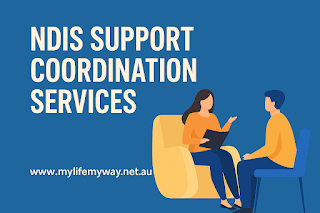Navigating the National Disability Insurance Scheme (NDIS) can be overwhelming for many participants and their families. The system involves multiple service providers, funding categories, and administrative tasks that require careful management.
Without the right guidance, individuals may struggle to maximise their plan's potential, leading to missed opportunities for essential support. This is where NDIS support coordination services in Adelaide play a vital role.
These services are designed to help participants understand, organise, and implement their NDIS plans effectively. Support coordinators work closely with individuals to ensure they receive the right services, maximise their funding, and simplify the process of accessing disability support.
In this blog, we will explore how NDIS support coordination makes disability support more efficient, reducing stress and improving outcomes for participants.

Understanding NDIS Support Coordination
NDIS support coordination is a professional service that helps participants navigate the complexities of their NDIS plan. It involves guiding individuals in choosing the right service providers, managing appointments, and ensuring their funding is used effectively.
Rather than leaving participants to figure out the system on their own, support coordinators provide expert advice and practical assistance, making the entire process more manageable.
There are three levels of NDIS support coordination services in Adelaide, each tailored to the participant's specific needs. Support connection helps individuals build their ability to use their plan independently, while standard support coordination focuses on assisting them in choosing and managing their services.
For those with complex needs, specialist support coordination provides intensive assistance in overcoming barriers to service access. Regardless of the level, the primary goal remains the same: to ensure participants receive high-quality, personalised support.
Reducing Complexity and Stress
One of the biggest challenges of the NDIS is managing the vast number of service providers available. With so many options, choosing the right one can be overwhelming. A support coordinator simplifies this process by identifying providers that align with the participant's goals and preferences.
They also help compare different options, ensuring that individuals receive the best possible care based on their needs and circumstances. Managing multiple appointments and services can also become a stressful task, particularly for individuals with complex support requirements.
A support coordinator takes on the responsibility of organising schedules, coordinating with service providers, and ensuring appointments do not conflict. This structured approach eliminates confusion and allows participants to focus on their well-being rather than dealing with administrative burdens.
Additionally, support coordinators provide ongoing assistance in resolving any issues that may arise. Whether it is difficulties with a service provider, misunderstandings regarding funding, or delays in accessing support, they act as a liaison to address concerns efficiently.
By handling these challenges, they reduce stress for participants and their families, ensuring a smoother NDIS experience.
Maximising NDIS Plan Utilisation
Many participants struggle to fully utilise their NDIS funding due to a lack of understanding or poor plan management. A support coordinator plays a crucial role in ensuring that no funding goes to waste. They review budget allocations, identify underutilised resources, and provide recommendations on how to make the most of the plan.
This proactive approach ensures that participants receive the full range of support they are entitled to, enhancing their quality of life. Plan reviews are an essential aspect of the NDIS, as they determine whether a participant's current support arrangements meet their needs.
Preparing for a review can be a complex process, requiring documentation and justification for ongoing or additional funding. Support coordinators assist in gathering relevant reports, assessing the effectiveness of existing services, and presenting a strong case for any necessary adjustments.
Their expertise ensures that participants are well-prepared for reviews and continue to receive the appropriate level of support.
Advocacy and Problem-Solving
Participants may encounter challenges when dealing with service providers, navigating the NDIS process, or requesting changes to their plan. Having a support coordinator means having an advocate who ensures their rights and choices are respected.
They communicate with providers on behalf of the participant, address any conflicts that arise, and provide guidance on how to handle difficult situations. In cases where participants feel their funding does not adequately support their needs, support coordinators can assist with appeals and reassessments.
Their understanding of NDIS policies and procedures allows them to effectively advocate for participants, ensuring they receive the support they deserve. By having a professional on their side, individuals can confidently navigate the system without feeling overwhelmed.
Conclusion
NDIS support coordination services provide invaluable assistance to participants by simplifying the process of managing their plans, reducing stress, and ensuring they receive the best possible support.
From selecting the right service providers to maximising funding and advocating for participants' needs, support coordinators play a crucial role in improving the overall NDIS experience.
For individuals looking to take full advantage of their NDIS plan without the burden of complex administration and decision-making, engaging with NDIS support coordination services in Adelaide is a practical and beneficial solution.
With expert guidance, participants can navigate the system with confidence, knowing that they have a dedicated professional working to ensure their support needs are met effectively.